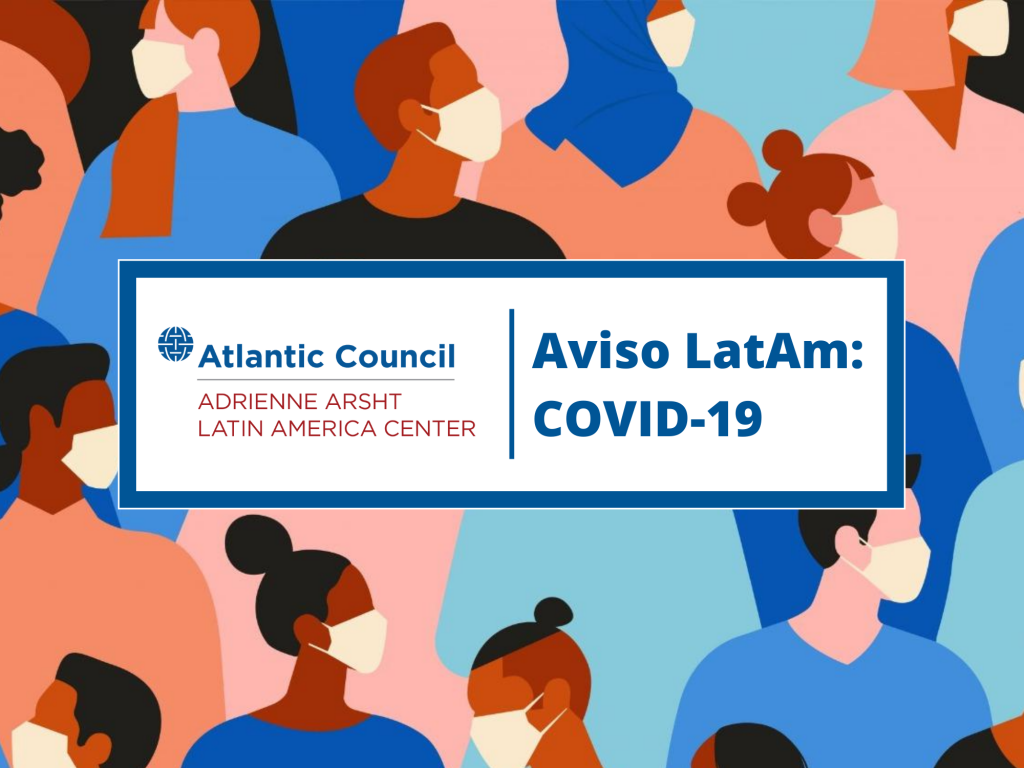What You Should Know
- 6 million-plus: On June 3, the Biden Administration laid out its strategy for global vaccine sharing and named the recipients of the first 25 million doses, 6 million of which will go towards Latin America and the Caribbean countries.
- $40 million: The amounted donated by the Government of Canada in support of the Pan American Health Organization’s (PAHO) efforts to increase COVID-19 vaccine access in Latin America and the Caribbean.
- 20 years: PAHO Director Carissa F. Etienne said the disruption of women’s health services due to the COVID-19 pandemic could “obliterate” more than 20 years of progress in reducing maternal mortality and increasing access to family planning in the region.
- Copa América: The main men’s football tournament in South America was set to be hosted by Colombia and Argentina this summer. Due to protests in Colombia and a surge in COVID-19 cases in Argentina, both countries were dropped by the tournament’s governing association. Just 13 days from the start date, Brazil was confirmed as host for the tournament.
By the numbers
- Vaccinations per capita (vaccines administered per 100 people): Chile (99) #7 worldwide, Uruguay (83) #14 worldwide, Barbados (43) #38 worldwide, Dominican Republic (4) #49 worldwide, Brazil (32) #56 worldwide, Guyana (31) #59 worldwide, El Salvador (31) #60 worldwide, Costa Rica (29) #61 worldwide, Argentina (28) #65 worldwide, Saint Lucia (26) #67 worldwide, Panama (25) #68 worldwide, Source: nytimes.com
Health + Innovation
- Mexico and Argentina: Last week, Mexico announced that AstraZeneca vaccine doses manufactured in Argentina and bottled in Mexico will begin shipping to other Latin American countries shortly. The two countries signed an agreement in August 2020 to provide 150 million doses to other Latin American countries.
- Grenada: The government announced it is considering sharing excess, soon-to-expire COVID-19 vaccines with its neighbors.
- Johnson & Johnson: Mexico approved the use of Johnson and Johnson’s COVID-19 vaccine. Mexico has also authorized the Sputnik V, Pfizer, AstraZeneca, CanSino, CoronaVac, and Covaxin vaccines.
- Cuba and Argentina: The two countries have signed an agreement to collaborate on COVID-19 vaccination in Cuba and Argentina as well as in other countries in the region. Cuba has five COVID-19 vaccines in different stages of development, with two in phase 3 clinical trials.
- GlaxoSmithKline: The US Food and Drug administration gave emergency use authorization to an antibody treatment developed by the British pharmaceutical company and immunology company Vir Biotechnology. The two companies entered an agreement back in April 2020 to combine their scientific and technical expertise to combat COVID-19.
- Guatemala: The country has fully inoculated less than 2 percent of its estimated population of 18 million. Although hoping to vaccinate 20 percent of its population through the COVAX facility, it has so far only received about 400,000 doses. Guatemala has received donations from India and Israel and has signed a contract with Russia. After the US announced 6 million doses will be donated to the region, President Alejandro Giammattei said that the US government would supply half a million doses to the Central American country.
- Jamaica: On May 30, 55,200 doses of the AstraZeneca vaccine allocated from the COVAX facility arrived.
Economies in Focus
Economic Impact
- Brazil’s economy returned to pre-pandemic levels with a growth of 1.2 percent in Q1 propelled by agricultural exports.
- Mexico’s manufacturing sector shrank for the fifteenth consecutive month in May due to subdued sales, raw material shortages, and the COVID-19 crisis. The outlook brightened, however, as the rate of decline was the second-slowest since the pandemic hit Mexico.
- In its monthly IMACEC economic activity index, Chile’s central bank reported that economic activity soared by a record 14.1 percent year-on-year in April, signaling early signs of recovery.
Multilateral Analysis
- Days before the US laid out its COVID-19 vaccine sharing framework, the World Bank said that it was crucial that the United States free up excess COVID-19 vaccines for Latin America.
- The Economic Commission for Latin America and the Caribbean’s Executive Secretary advocated for reform of the multilateral tax system to enable a sustainable and egalitarian economic recovery.
- The International Monetary Fund projected that Latin America and Caribbean economies will not regain their previous per-capita income levels until 2024.
- The Organisation for Economic Co-operation and Development (OECD) revised its initial 2021 global growth projection to 5.8 percent from 5.6 percent, but it warned of unequal growth across countries. Specifically, the OECD said countries like Argentina would take over three years to return to pre-pandemic levels of per-capita GDP.
- In a Caribbean COVID-19 Food Security and Livelihoods Impact Survey launched by CARICOM and implemented by the World Food Programme, data from Barbados points to higher than usual food prices, limited availability of fresh foods, and reduced food consumption across respondents. Similarly, a UNICEF report issued on May 31 projects severe acute childhood malnutrition to more than double this year in Haiti, as the country continues to grapple with the COVID-19 crisis.
Social Transformations: Hurricane Season Amidst Pandemic
- The International Federation of Red Cross and Red Crescent Societies (IFRC) issued a press release stating that the organization is ramping up efforts across the Americas to prepare for the upcoming hurricane season amid the COVID-19 pandemic.
- With experts predicting thirteen to twenty named storms forming in the Atlantic Ocean, these storms could bring further devastation to a region still reeling from last year’s storms and hurricanes as well as the ongoing pandemic. Six months ago, Hurricanes Eta and Iota affected over 7.5 million people.
- To mitigate the logistical challenges posed by pandemic restrictions, the IFRC has pre-positioned humanitarian goods across Central America and the Caribbean to provide immediate humanitarian relief to over 60,000 people.
